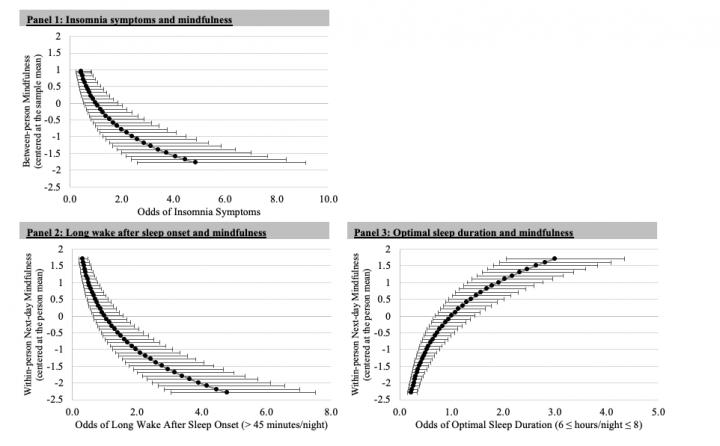
Credit: University of South Florida
Sleeping an extra 29 minutes each night can be the key to improving mindfulness, a critical resource that has benefits for daily well-being and work performance. Mindfulness is achieved by purposefully bringing an individual’s awareness and attention to experiences occurring in the present moment without forming an opinion. Unlike previous studies, new research published in Sleep Health looked at how multiple dimensions of nightly sleep impact daily mindfulness, rather than just focusing on sleep quality or duration.
The study led by the University of South Florida found better sleep improves next-day mindfulness, which in turn, reduces sleepiness during the day. The research focused on nurses, the largest group of healthcare professionals whose need for optimal sleep and mindful attention are particularly high. Sleep problems are common in this population due to long shifts, lack of situational control and close proximity to life-threatening health conditions. Their optimal sleep health and mindful attention are particularly important as they work the frontline of the COVID-19 pandemic.
“One can be awake and alert, but not necessarily mindful. Similarly, one can be tired or in low arousal but still can be mindful,” said lead author Soomi Lee, assistant professor of aging studies at USF. “Mindful attention is beyond being just being awake. It indicates attentional control and self-regulation that facilitates sensitivity and adaptive adjustment to environmental and internal cues, which are essential when providing mindful care to patients and effectively dealing with stressful situations.”
Lee and her colleagues from USF and Moffitt Cancer Center followed 61 nurses for two weeks and examined multiple characteristics of sleep health, They found that nurses’ mindful attention was greater than their usual after nights with greater sleep sufficiency, better sleep quality, lower efficiency and longer sleep duration (an extra half-hour longer). Daily mindful attention contributed to less same-day sleepiness. Those with greater mindful attention were also 66% less likely to experience symptoms of insomnia during the two-week study period.
Researchers come to these conclusions by using a variety of tools to measure how much participants were mindful each daily moment and how their mental states were impacted by sleep. Participants were prompted to answer daily mindfulness and sleepiness questions three times a day for two weeks using the smartphone application, RealLife Exp. Daily mindfulness was measured by the Mindful Attention Awareness Scale, which asked questions such as, “I was doing something automatically, without being aware of what I was doing,” and “I was finding it difficult to stay focused on what was happening.” Participants also wore an Actiwatch Spectrum device for the same two weeks that measured wrist movement activity to quantify sleep and wake patterns.
Findings from this study provide insight into developing a behavioral health intervention strategy for a broader array of healthcare workers who need better sleep and mindful attention. Given the association between mindful attention and better patient care, improving sleep in this population may provide important benefits to patient health outcomes as well.
###
Media Contact
Tina Meketa
[email protected]




